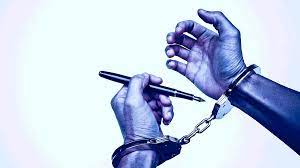The press in Zambia has for a long time been seen as a key pillar of democracy and public education. This was evident when under the one-party rule, the media with regularity advocated for a return to multiparty democracy, consequently leading to the fall of the United National Independence Party (UNIP) in the 1991 general elections.
The democracy that the media planted in 1991 brought into office the Movement for Multiparty Democracy (MMD) and also increased freedom for the media as the Fourth Estate’s rights and freedoms were guaranteed in the Zambian constitution. According to Article 20 (1) (2) no person’s freedom of expression, freedom to hold opinions, freedom to impart and communicate ideas shall be interfered with, and no provisions of the law shall derogate from the freedom of the press.
However, according to the World Press Freedom Index, a survey conducted in 180 countries by Paris-based Reporters without Boarders (RSF), press freedom in Zambia has significantly deteriorated since the country was first added to the index in 2013. Zambia was in position 72 in 2013, and then rose to position 120 in 2020, before falling to number 115 in the latest rankings released this year.
In an interview with the Lusaka Star, Chanda Mfula, a Doctorate student in Media Studies, Journalism and Democracy at the University of Sussex, argued that the improved position of Zambia in the 2021 World Press Freedom Index is not significant as the country’s media has continued to operate in a shackled environment.
That is not an improvement. This could actually mean that some authoritarian countries somewhere dropped in the rankings while Zambia remained in the same spot,
Mfula said.
It (latest index) simply means someone else did as bad as or worse than Zambia. What can be the improvement if Prime TV and the Post newspapers are still closed and the public media still function as propaganda tools for the ruling party?
Mfula, who is also former Patriotic Front(PF) Media Director, further alleged that the current government cannot safeguard press freedom as it has made the media very timid due to the chilling effect from the shutdown of media houses and the newly enacted Cyber security and Cyber crimes law.
Due to the closure of media houses prior to the 2016 elections, the media are worried and scared of what this (PF) regime can do. Laws have not gotten any better. We have a draconian cyber law which will be used to suppress even online media,
he added.
However, MISA Zambia Programs Officer, Jane Chirwa said that the levels of press freedom in the country over the last one year have been fair as only three major incidents infringing on freedom of the press were recorded.
She however disclosed that her organisation has engaged the government as it is concerned that the implementation of the Cyber security and Cyber crimes law might hinder on the freedom of the press.
The laws that are made must not inhibit press freedom. And one of the issues that we have raised with government and they have taken it into consideration is on the cyber security law. So as MISA, we are cautiously checking on its implementation.
Chirwa said.
Meanwhile, in an unprecedented move, Ministry of Information and Broadcasting Services permanent secretary, Amos Malupenga last month marched to Zambia Police Headquarters to demand that the men in uniform do more to guarantee the safety of journalists, especially as the country heads towards the August polls.
Malupenga told Deputy Inspector General of Police for Administration, Richard Mweene, that government supports a free press and a safe working environment for journalists, hence, saddened by the continued attacks on the media.
Journalists are more vulnerable towards elections because of the nature of their job, therefore, I came here to police headquarters to lodge a complaint on their behalf,
he stated.
The Permanent Secretary also said that the Cyber security and Cyber crimes Act will enhance the Zambia Media Council (ZAMEC) Bill, which seeks to promote professionalism in the media industry.
Our ministry supports the Cyber Security law because it provides for lawful interception of communication. This is in line with the provision of Article 20 of the constitution,
Malupenga added.
President Edgar Lungu also reiterated Malupenga’s sentiments when in his address to the National Assembly on February 12, 2021, when he said that his government recognised the importance of a free media in the governance system, and was committed to supporting media institutions and freedom of expression.
I am a firm believer of press freedom and as we approach the general election this August, I call upon all Zambians to allow journalists to perform their function of reporting on events leading to these elections freely,
President Lungu said.
Just like in 1991, the media’s role in the 2021 general elections cannot be understated as it has the power to empower a voter to exercise their political rights in a way that may maintain or change the country’s leadership. It is for this reason that the press must be free from interference so that it plays its watchdog role of sniffing and barking at corruption, injustice and inefficiencies of politicians offering themselves for public office.
Infact, there is a direct relationship between media freedom and free and fair elections, as the free flow of information and dissemination of different political views leaves a voter in a better position to make an informed decision. However, muzzling the press by threatening violence and dictating how or what to write will only compromise the right to vote of many Zambians.

